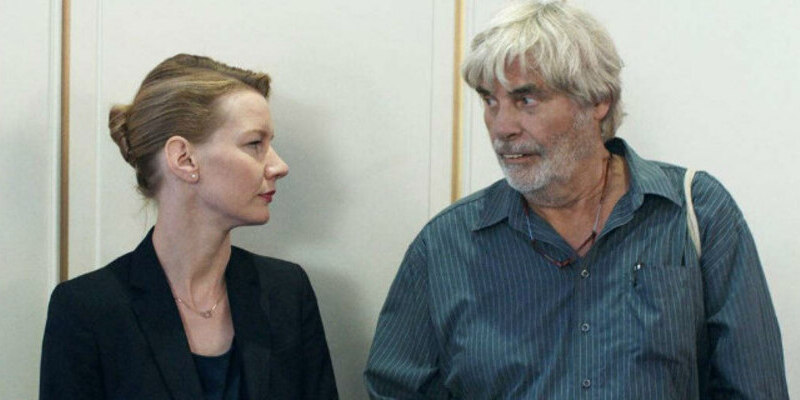
Review by
John Bennett
Directed by: Maren Ade
Starring: Peter Simonischek, Sandra Huller, Michael
Wittenborn

It’s been a while since Maren Ade sat in the director’s chair; her
last film, Everyone Else, hit screens in 2009. Since then she’s worked as a producer, helping
directors like the very talented Miguel Gomes, among others, get their films
made. Everyone Else was a very effective, ambiguous (and often
cringe-worthy) anatomy of a romantic relationship. Ade is back from her
directorial absence with her new film, Toni Erdmann, a film that uses the same clinical eye from Everyone Else, this time to dissect a father-daughter relationship.
Toni Erdmann, which played in competition for the Palme d’or at Cannes and won the
FIPRESCI prize, feels like the kind of full, satisfying work of art that Ade
has been building up to. It’s a funny, perceptive, sprawling, nervous work
that will leave you laughing, cringing and thinking seriously about your own
dysfunctional family dynamic in equal measure.

At the start of Ade’s boldly off-kilter family comedy, Winfried (Peter Simonischek), a lonely man in late middle age, spontaneously decides to follow his
adult daughter, Ines (Sandra Hüller), to her business trip in Romania
after the death of his dog. Ines, an anxious workaholic, is perpetually
embarrassed by the way her prankster father oafishly but endearingly inserts
himself into her professional and social lives. During a night out with some
colleagues, Ines lays into her father, thinking he has returned to Germany.
Little does she know that lurking behind her at the bar with a wig and his
favorite pair of false teeth is Winfried, who, in his most ambitious prank,
introduces himself to Ines and her friends as the titular Toni Erdmann, a
bizarre yet humorously hunched and grinning monster of a character. Too
mortified to expose her father’s ruse, Ines goes along with the setup. For a
large remainder of the business trip, Winfried and Ines find that they end
up using Toni as a strange surrogate for trying to understand and
communicate with one another in a more honest way, eroding their de facto
estrangement.
The remarkable thing about Toni Erdmann is the way Ade
handles tense family interactions. The dynamic that Ade has created for
Winfried and Ines is, well, dynamic; the film demonstrates that our
relationships with those we hold dear are never one thing: the tenors of
these interactions constantly change from ones of admiration to surprise to
annoyance to contempt to simple neutral coexistence back to admiration
infinitum ad absurdum. Ines is amused when her father gets her a cheese
grater for her birthday; she’s annoyed when he’s invited to a business
after-party; she regards him more or less evenly during lunch at a hotel
spa.

At one point late in the film, Ines, during an awkward intensification of
her father’s prankster sensibility (and possibly during a small mental
breakdown), decides on a whim to answer the door for a business party in the
nude, informing her stunned guests that the party will be thrown au natural.
Surprise, surprise Toni/Winfried, unaware of his daughter’s idea, shows up
in a giant furry costume like nothing you’ve seen before. In a visual
expression of how the two are on different, confused emotional pages, Ines’s
complete pale exposure visually counters Toni/Winfried’s dark shaggy
concealment. It’s after this bizarre failed party that Ines and Winfried
discover themselves in sync, and it becomes a moment of pure love and
understanding. Yet Ade smartly doesn’t make this a played-out reconciliatory
end - like I said, she’s interested in showing how a father and a daughter
constantly revise their appraisals of one another. Rather, this moment of
understanding ebbs back into Ines and Winfried’s unsynchronised song and
dance of love, annoyance, and uncertainty. Though stylised (in narrative
more than visuals), the truth that Ade drives at in this regard makes
Toni Erdmann feel very real and alive.

Simonischek and Hüller wonderfully convey and sustain these complicated
ideas throughout the duration of the film, but they also keep
Toni Erdmann happily grounded and entertaining - Simonischek
with his constant low-key good-natured joker spirit, and Hüller with her
droll mortification and exasperation, alleviated every now and then by the
same prankster proclivities as her character’s father. In one scene,
Toni/Winfried “arrests” Ines for having done cocaine by placing her in
handcuffs. Not amused and late for a meeting, Ines demands the key…ach du
lieber! He can’t find it, forcing the two to take an unscheduled trip to a
blacksmith. The sequence is cringingly hilarious and light-on-its-feet while
still advancing the film’s slightly more sober ideas. In this scene, and
many like it, the two actors are so in tune with each other that they appear
to be as responsible for crafting the film’s story and tone as Ade;
Toni Erdmann projects an improvisational goofiness that keeps
the film downright entertaining for the majority of its running time.
That is to say, entertaining for the majority, if not the whole thing: at
162 minutes, Toni Erdmann starts to feel a little
self-indulgent by the last reel. It’s a problem, but not a major one. Even
if Toni Erdmann becomes a bit excessive, it doesn’t do so
until around its final half hour; the film is mostly deeply engrossing, and
whatever flaws it has are more than compensated for by the brilliant work
that Ade, Simonischek, and Hüller sustain for the vast majority of this
funny, deeply intelligent film.

Toni Erdmann is on MUBI UK
now.
